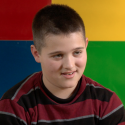
Show the feeling word
Close
Thrilled
feeling very excited all of a sudden
Take it further
Emotions matter. Emotions influence our decision making and color our relationships. Research shows that children who develop emotional intelligence skills are kinder, happier, healthier, and more successful. Help your child develop emotional intelligence by playing another round of our feeling words game.
Conversation starters:
-
How did she show us that she was thrilled? (With her voice, body, or face?)
-
Have your child tell you about a time when they felt thrilled. Ask them for lots of details: “Where were you? What was the scene like? What were your face and body like? What about your voice? Can you show me?”
Activities:
Play the game Would You Rather? with your child, focusing on the most incredible, thrilling experiences you can imagine. Usually kids play this with gross experiences (Would you rather kiss a slug or make soup with your brother’s socks?), but this time use the game to explore what really makes you feel thrilled.
Plan a thrilling experience in your next week. You might not be able to ride a roller coaster, but you could play a game of hide-and-seek, create a treasure hunt for the Friday night cookie, or plan a thrilling surprise for someone in the family. Then talk about the experience after: Was it really thrilling? What goes on inside your head during a thrill?
Book lists:
Explore stories about feeling thrilled in our feeling word book lists:
Watch more Do you feel me? videos and learn more about emotions.
Read more about the Feeling Words Curriculum.
Have some fun with feeling words with our MadSadGlad Libs.
Read more about the Feeling Words Curriculum.
Have some fun with feeling words with our MadSadGlad Libs.


